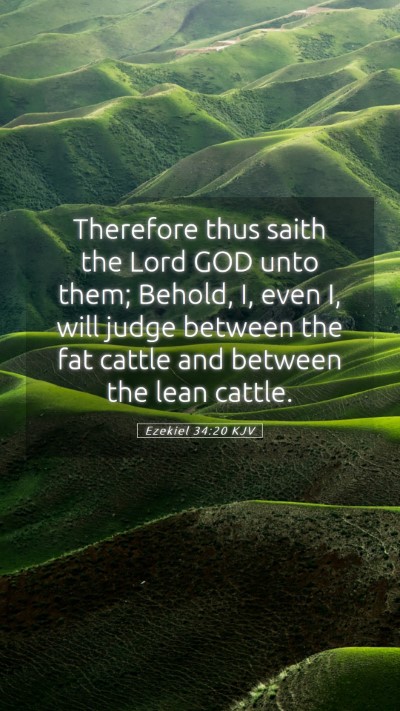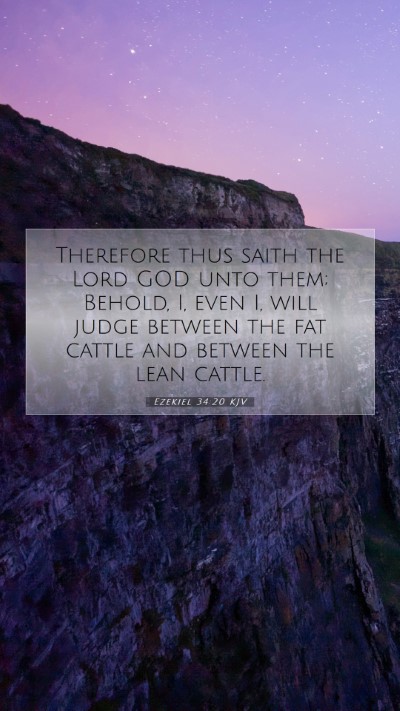Bible Verse Interpretation: Ezekiel 34:20
Bible Verse: Ezekiel 34:20 - "Therefore thus says the Lord God to them: 'Behold, I judge between sheep and sheep, between rams and male goats.'
This verse is a profound declaration by God through the prophet Ezekiel, addressing the leaders of Israel, often referred to as the "shepherds." In this text, God emphasizes the need for righteous judgment and accountability within His flock.
Understanding the Context
The context of Ezekiel 34 focuses on God's disapproval of Israel's leaders, who were failing to protect and guide the people. This chapter serves as a critique of the shepherds who were neglecting their duty to care for the flock and instead indulging themselves, leading to the suffering of the people.
Key Themes from Public Domain Commentaries
- Accountability of Leaders: Matthew Henry observes that God's judgment will be upon those who lead His people poorly.
- Judgment between the Flock: Albert Barnes points out that God's justice will differentiate between the true followers and those who mislead.
- Protection and Care: Adam Clarke emphasizes God's role as a protector, ensuring the well-being of His faithful followers.
Bible Verse Meanings
The phrase "I judge between sheep and sheep" indicates a divine evaluation of individuals within the community. It signifies that God discerns the intentions and actions of each person, emphasizing the personal relationship between God and His followers.
Biblical Exegesis
This verse not only conveys God's intention to differentiate between His faithful followers and those leading them astray but also indicates a restorative purpose; God seeks to bring righteousness and equity back into the community.
Application of Scripture
Understanding this verse is crucial for any believer seeking to apply biblical teachings to daily life. It reminds us of the importance of righteous leadership in both spiritual and secular realms.
Insights for Bible Study Groups
For those involved in bible study groups, this verse can lead to discussions on the responsibilities of spiritual leaders and the importance of accountability within communities.
- How can we ensure our leaders remain accountable?
- What does it mean to be a shepherd in today's world?
- How can we uphold justice and righteousness in our communities?
Historical Context
Examining the historical context allows for deeper understanding of Scripture. In ancient Israel, the role of shepherds was critical, not only in a literal sense of caring for sheep but also in guiding and nurturing the people spiritually.
Cross References
- Jeremiah 23:1-4: A similar condemnation of bad shepherds and promise of restoration.
- Matthew 25:31-46: The judgment of nations based on their treatment of 'the least of these.'
- John 10:11-16: Jesus as the Good Shepherd differentiating His true followers.
Final Thoughts
In summary, Ezekiel 34:20 is a call for introspection among leaders and followers alike. It emphasizes God's commitment to justice and care, serving as a powerful reminder of our responsibilities towards one another in faith. Incorporating insights from biblical commentaries, this verse provides a basis for understanding leadership, justice, and righteousness.


